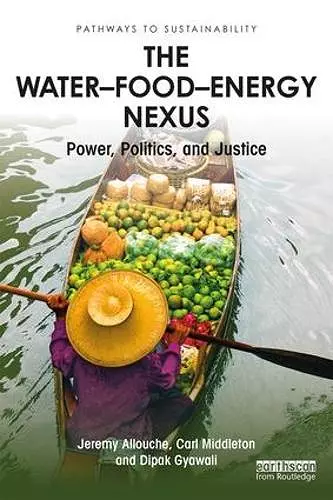The Water-Food-Energy Nexus
power, politics and justice
Carl Middleton author Jeremy Allouche author Dipak Gyawali author
Format:Paperback
Publisher:Taylor & Francis Ltd
Published:17th Apr '19
Currently unavailable, and unfortunately no date known when it will be back
This paperback is available in another edition too:
- Hardback£145.00(9781138714274)

The world of development thinkers and practitioners is abuzz with a new lexicon: the idea of "the nexus" between water, food, and energy which is intuitively compelling. It promises better integration of multiple sectoral elements, a better transition to greener economies, and sustainable development. However, there appears to be little agreement on its precise meaning, whether it only complements existing environmental governance approaches or how it can be enhanced in national contexts. One current approach to the nexus treats it as a risk and security matter while another treats it within economic rationality addressing externalities across sector. A third perspective acknowledges it as a fundamentally political process requiring negotiation amongst different actors with distinct perceptions, interests, and practices. This perspective highlights the fact that technical solutions for improving coherence within the nexus may have unintended and negative impacts in other policy areas, such as poverty alleviation and education.
The Water–Food–Energy Nexus: Power, Politics and Justice lays out the managerial-technical definitions of the nexus and challenges these conceptions by bringing to the forefront the politics of the nexus, around two key dimensions – a dynamic understanding of water–food–energy systems, and a normative positioning around nexus debates, in particular around social justice. The authors argue that a shift in nexus governance is required towards approaches where limits to control are acknowledged, and more reflexive/plural strategies adopted.
This book will be of interest to academic researchers, policy makers, and practitioners in the fields of international development studies, environmental politics, and science and technology studies, as well as international relations.
"Beyond the commonplace recognition that the 'nexus' conceptual basis is not new and that integrative imperatives already featured in IWRM, this book further examines the underbelly of the beast and convincingly exposes the political underpinnings of a concept presented as a-political and 'manageable' through integrative tools, expert modeling, bureaucratic reforms and rational efficiency-driven thinking. It reveals the underlying business imperatives and green economy logics, traces the global diffusion of the concept, and emphasizes that issues of distributional justice, knowledge production and democratization of governance need to take center stage if the concept is to be transformative rather than supporting the status quo. An excellent reading for all water students and scholars interested in deciphering the word of water concepts and the interests and values that undergird them." — Francois Molle, Editor of Water Alternatives
"We frequently hear of the nexus - but what does this mean, what does it entail, and where to begin? To such questions, Allouche offers a critical guide. Careful to consider complexities and uncertainties, the theoretical discussion coupled with multi-sited case studies, offers a compelling treatment. Readers wanting to know more of the concept, including political economic and equity implications, will find reading the book to be time well spent." — Leila M Harris, University of British Columbia, Canada
"Skilfully delving into the nuances of the nexus approach, the authors trace and explain the emergence of the ‘new’ concepts of nexus – between water, food, energy, environment and more. Unravelling the tangle of nexus-invoking discourses, motivations and practices yields a valuable, sense-making analysis." — John Dore, Australia’s Department of Foreign Affairs and Trade
"The book does a great job at showing how a water-energy-food nexus approach emphasises demand-led technological and market solutions, downplays supply-side limits, promotes a technical and supposedly apolitical treatment of trade-offs, and largely ignores the political dimensions that shape control over, and access to, resources." — Molle, F. 2019. Review of "The water-food-energy nexus. Power, politics and Justice", Earthscan, 2018, by Allouche, J.; Middleton, C. and Gyawali, D., Water Alternatives, http://www.water-alternatives.org/index.php/boh/item/19-nexus
ISBN: 9780415332835
Dimensions: unknown
Weight: 240g
150 pages